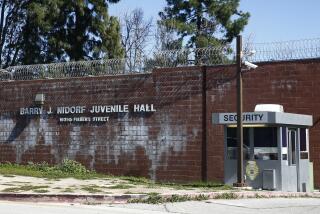Juvenile injustice: $350 to defend a child
Three hundred fifty dollars. That’s the amount Los Angeles County pays a private attorney to represent a child charged with crimes when the public defender has a conflict of interest and can’t handle the case. That $350 has to cover all legal work, even when the child is charged with a serious crime such as murder or rape. About 11,000 kids a year end up being represented by such appointed counsel.
Here’s how it commonly works. Let’s say two 15-year-olds are caught with a six-pack of beer and charged with illegal possession of alcohol. Because they may have incentives to testify against each other, the rules of legal ethics require that different law firms represent them. So, typically, one would be represented by the public defender while the other’s case would be contracted out to an attorney earning a total fee of $350.
This compensation system has created profound inequalities in the legal services provided to children.
Public defenders are hired through a highly selective national recruiting process. They are trained by senior attorneys and work in an office that rewards zealous advocacy with promotions and raises.
The county requires no vetting of appointed attorneys, nor does it have requirements for special training or experience. They are not held to meaningful performance standards. The public defender, unlike an appointed attorney, has access to a staff of investigators, support attorneys and social workers to assist in preparing a case. Although both a public defender and an appointed attorney may request that experts be appointed by the court, clients of the public defender are twice as likely to have those experts appointed. The courts rarely if ever appoint investigators, so kids without public defenders are out of luck on that front.
Most important, because contract attorneys are paid a single fee (which hasn’t changed since 2009), their effective hourly rate shrinks with each successive task they perform. The more work they do on a case, the lower their hourly rate of pay.
In 2012, our research team finished a study of the Los Angeles juvenile justice system aimed at determining whether there were significant differences between the outcomes of clients represented by public defenders and those represented by appointed attorneys. Teams of researchers reviewed more than 3,000 randomly selected cases that spanned four years and came from every juvenile court in Los Angeles. The results, which will be published this fall, clearly demonstrate that there are huge differences in outcomes depending on whether a child is represented by a public defender or a $350-fee attorney.
The study controlled for factors such as age, ethnicity, prior convictions and the type of charge, then compared how the two kinds of clients fared. Those represented by appointed counsel were convicted of more serious offenses and given longer sentences in more restrictive environments. Judges have seven distinct sentencing options for young offenders, from diversion to incarceration in state prison. We found that those represented by the $350-fee attorneys had a 34% higher likelihood of ending up at a higher level of supervision than those facing the same charges but represented by public defenders.
The study confirms how important effective lawyering is in juvenile court. The attorney is the only member of the court team who has unfettered access to a defendant’s psychological, medical and educational history. An attorney with a disincentive to invest his time and effort may not discover or communicate information crucial to the child’s case, leaving courts operating in the dark.
Even if you leave aside the gross inequities and look at the current system in purely economic terms, it makes sense to change it. The policy is costing Los Angeles County a lot of money. Our study predicts that last year, 586 fewer youths would have been sent to probation boot camps had they been represented by the public defender. With an average stay of six months in camp at a cost of about $307 a day (excluding school costs), these extra 586 detainees cost the county $28 million to $31 million.
Oddly, the adult criminal system does not pay attorneys a flat fee; rather, attorneys assigned cases because of a conflict of interest are paid either a salary or an hourly rate based on the seriousness of the offense. Bringing the juvenile system more in line with that policy could save money. More important, it could remedy a great injustice.
Cyn Yamashiro is a clinical professor of law and director of the Center for Juvenile Law and Policy at Loyola Law School.
More to Read
A cure for the common opinion
Get thought-provoking perspectives with our weekly newsletter.
You may occasionally receive promotional content from the Los Angeles Times.










